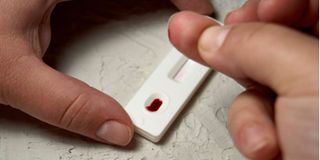Urgent action needed as Covid-19 could accelerate adolescent HIV

A person taking an HIV test.
What you need to know:
- We can already see early signs of this – national helplines have reported a tenfold increase in reports on violence against girls and women since the start of the Covid-19 outbreak.
- In Homa Bay County, youth aged 15-24 contribute 13 per cent of the total number of HIV infections amongst 15-49-year olds in the county.
For young people in Kenya, the risks of Covid-19 stretch way beyond the effects of the virus itself. We believe that Covid-19 and the containment measures could be contributing to new spikes in adolescent HIV as evidenced by reduced access to essential HIV prevention services and along with other unintended consequences such as unintended pregnancy and sexual and gender-based violence.
With schools fully or partially closed, many children have been away from the protective environment of school for months. Families are facing financial hardship, food insecurity, stress and uncertainty.
This creates the conditions for an increase in abuse, sexual violence in homes and communities and in transactional sex, which can lead to an increase in sexually transmitted infections including HIV and unintended pregnancies among adolescents. We can already see early signs of this – national helplines have reported a tenfold increase in reports on violence against girls and women since the start of the Covid-19 outbreak.
Unicef and UNAIDS are particularly concerned about the most vulnerable children in areas of Kenya that already have the highest rates of HIV. For example, in Homa Bay County, youth aged 15-24 contribute 13 per cent of the total number of HIV infections amongst 15-49-year olds in the county. The picture in other counties in the western and lake basin region is similar.
Devastating emotional issues
The consequences of a further rise in HIV could be wide-ranging. As well as causing serious health problems, HIV can lead to devastating emotional issues due to stigma and discrimination. And in a vicious circle, while Covid-19 puts adolescents at greater risk of acquiring or spreading HIV, people living with HIV are also at greater risk of severe Covid-19 infections that can lead to death.
As the global Aids epidemic continues, we need to act. Homa Bay County government has commissioned research, carried out by LVCT Health and the Overseas Development Institute supported by Unicef, to analyse the root causes of adolescent HIV, as well as teenage pregnancies. The findings of ‘Unintended pregnancies and HIV among adolescents and young people: A situation analysis of Homa Bay’, offer important local, regional and country-wide lessons.
Firstly, gender inequality is a major driver of HIV infections in adolescents. Girls often have little control in relationships or in the use of condoms and other forms of contraception. They may conduct transactional sex to secure food for their families.
The report also highlights limited access to adolescent HIV services and inadequate sexuality education in schools. Lastly, the report finds that vulnerable young people get caught up in risky behaviours and cultural practices such as ‘disco matanga’.
At this critical time, we must move quickly to address these issues in Homa Bay and nationwide. We need to see improved and budgeted programming, focusing on addressing harmful gender norms, as well as find channels to provide culturally and age-appropriate sexual reproductive health education for those in school and out-of-school.
Finally, the health system can do more to be responsive to adolescents and young people through the provision of comprehensive services both at facility and community level.
New HIV infections
Extraordinary change is possible when we work together. Since 2013, there has been a 66 per cent reduction in the rate of new HIV infections among 10 to 19-year-olds in Kenya, as the country followed an ambitious path to reduce new HIV infections to zero by 2030. During this period, Kenya has also led Africa in the rollout of pre-exposure prophylaxis, HIV self-testing and voluntary male medical circumcision.
Young people also need hope and opportunities to create a better future. This is why the UN is investing in expanding horizons for young people, as a key partner with the government in the Generation Unlimited partnership.
Through a multitude of programmes, the partnership aims to expand opportunities in education, training and employment for the young people in Kenya. Let us join hands in a deliberate effort to listen, understand and engage adolescents and young people in propelling a youth-centred response that offers them the best chance in life.
Twitter: @maniza_zaman; @Medhin_Tsehaiu





